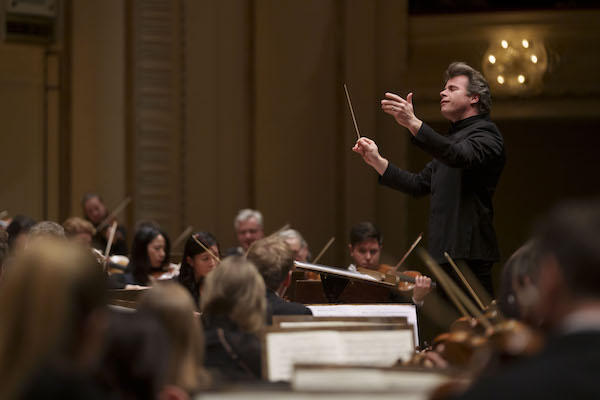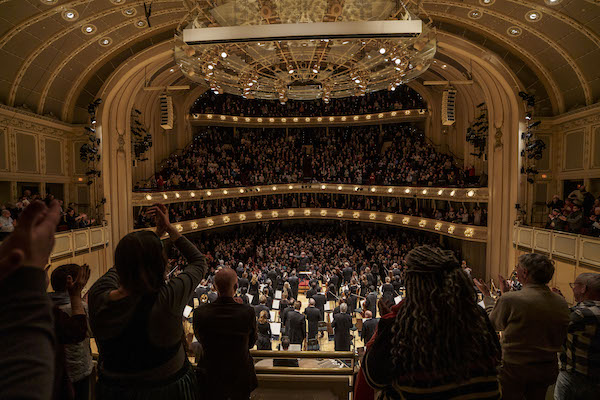Hrůša, Staatskapelle Berlin strike sparks with fresh, exhilarating Brahms

The Staatskapelle Berlin is one of the oldest continuously active orchestras in the world, with origins dating back to 1570 as a court ensemble. The venerable German orchestra splits its time between acting as the pit band of the Berlin Staatsoper and presenting symphony concerts.
In the past century, the Staatskapelle has been led by such luminaries as Richard Strauss, Erich Kleiber, and Herbert von Karajan. On its last U.S. tour in 2017 under Daniel Barenboim, the orchestra achieved a bit of musical history as the first orchestra to perform a complete Bruckner cycle at Carnegie Hall.
Barenboim, the Berlin ensemble’s music director from 1999 to 2023, was to have led the orchestra on its current U.S. tour but bowed out due to illness on short notice.
One must be grateful to Jakub Hrůša for saving the day in Chicago. Having just wrapped up his Lyric Opera run leading performances of Leoš Janáček’s Jenůfa on Sunday, the Czech conductor agreed to take the helm for Tuesday night’s concert at Orchestra Hall.
With minimal rehearsal time, which pushed beyond Tuesday’s house-opening time—and a debuting conductor leading them, one wasn’t expecting a concert for the ages.
Yet despite a few ensemble lapses and errant entrances—likely due to the musicians being unused to Hrůša’s baton style—the Staatskapelle Berlin served up some bracingly fresh and exhilarating Brahms to a large and enthusiastic audience.
In its first Chicago appearance in 19 years, the Staatskapelle showed itself a fine, flexible and virtuosic ensemble. Performing with violins split left and right, the Berlin orchestra presents a lean corporate sonority, lacking some richness in the strings, yet with superb principal players, especially the characterful woodwinds and distinguished brass.
The all-Brahms program led off with the Symphony No. 3. While ostensibly the shorter and lighter of the two symphonies on the program, there was nothing casual or lightweight about Tuesday’s performance.
Rather, this was a Brahms Third of great breadth—generous with repeats—vitality and eloquence. Hrůša judged the tricky tempos of the opening deftly, nicely drawing out the two rising chords that herald the main theme. The movement was bracing and unusually volatile with a strong coursing line throughout.
The pastoral Andante captured that elusive, sweet-sad quality of Brahms’ lyricism, ardent and expressive yet unsentimental, highlighted by the woody-toned clarinets of Tibor Reman and Matthias Glander. Hrůša aired out the opening notes of the Poco allegretto, which featured piquant playing and more wonderful clarinet work.
The finale was fast, surging and dramatic yet remained rooted in the overall canvas. Hrůša judged the concluding slowdown skillfully though, unfortunately, the horns buried the strings’ gentle final reprise of the main theme at the coda.

The Symphony No. 1 followed after intermission. If perhaps less individual than the preceding performance of the Third, this was still outstanding Brahms by any measure. As shown by his CSO stands, Hrůša is a dynamic podium figure and his energetic persona drew committed and propulsive playing in the framing movements. The interior sections of the symphony again proved a highlight with the Andante highlighted by lovely solos from oboist Gregor Witt and concertmaster Wolfram Brandl.
Hrůša was at his finest in the conclusion, building the tension in the gathering storm clouds that open the finale. Karsten Hoffman lofted an understated yet eloquent horn solo and the Beethovenian main theme made sure impact. The conductor charted the ebb and flow superbly while maintaining firm dramatic cut, racheting up the intensity to a fiery, thrilling finale and emphatic final chords.
The Staatskapelle musicians were clearly grateful and impressed by their maestro du jour. Hrůša and concertmaster Brandl embraced and the conductor was warmly applauded by the Berlin musicians.
Despite a long and rousing audience ovation, no encore was offered. But the evening’s excellent and filling Brahms performances made a bonus dessert feel unnecessary.
Yannick Nézet-Séguin conducts the Staatskapelle Berlin in Brahms’ Symphonies Nos. 1 & 2, 8 p.m. Thursday at Carnegie Hall and Nos. 3 & 4 on Friday. carnegiehall.org